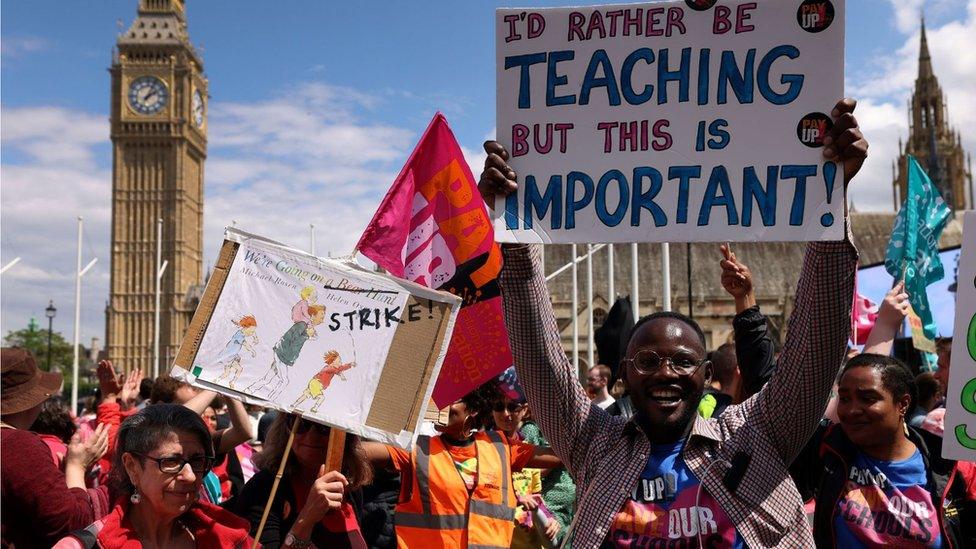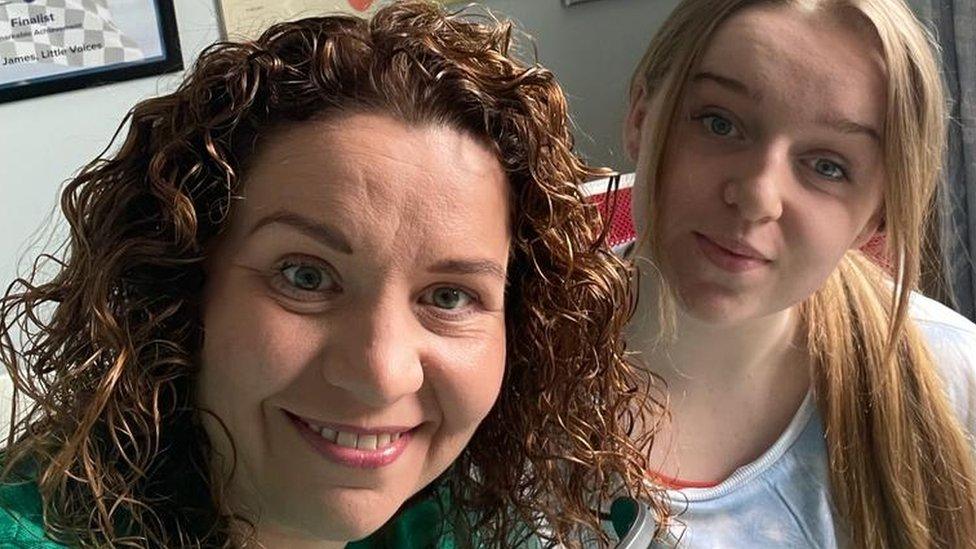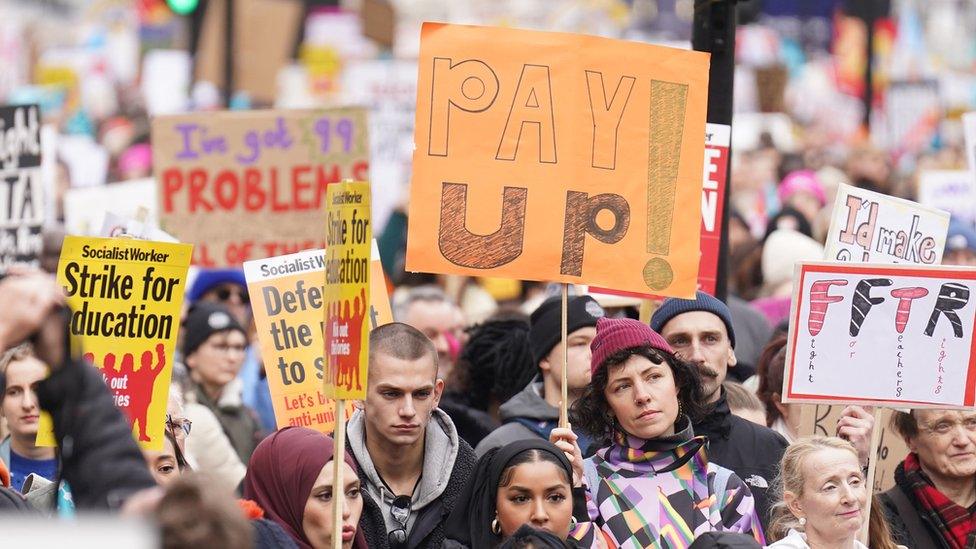Teacher strikes in England end as all four unions accept pay deal
- Published

Teachers last went on strike at the beginning of July
Teacher strikes over pay have ended in England, after all four unions in a dispute with the government accepted a 6.5% pay rise.
Members of the NEU, the UK's largest teaching union, voted overwhelmingly to accept the pay offer.
The NASUWT and NAHT unions also accepted the deal on Monday, with ASCL doing the same earlier in July.
The education secretary said the offer being accepted was "good news" for teachers, parents and pupils.
And Prime Minister Rishi Sunak, writing on Twitter, said: "This is a big moment."
Mary Bousted, joint general secretary of the NEU, said the deal meant the average teacher's salary would increase by £2,500.
"It's not all that we wanted, and we will continue to campaign for better school funding and for a restoration of teacher pay - but for a one-year pay award, it is a significant achievement," she told the BBC.
Both sides in the dispute said the pay offer was "properly funded" and would not come from existing school budgets.
NEU teachers in England have been on strike on eight days since February - seven national and one regional - forcing many schools to close.
All four unions have been balloting members since May about holding strikes in the autumn term, and said they would co-ordinate strike action for maximum impact.
ASCL called off its ballot in July after accepting the pay offer.
The NAHT, NASUWT and NEU announced that their members had voted in favour of those strikes - but that no co-ordinated action would take place following separate votes to accept the pay offer.
However, the unions also said they were not fully satisfied with the offer they have accepted.
Joint general secretaries Ms Bousted and Kevin Courtney said the NEU's campaign for improved pay and higher funding for schools "will not go away".
Paul Whiteman of the NAHT also pledged to continue to negotiate with government on issues around workload and wellbeing.
NASUWT's general secretary Patrick Roach said members did not believe the offer was "sufficient redress for the impact of more than a decade of real-terms pay cuts".
NASUWT secured a mandate for strike action over pay, workload and working hours - though that was before the latest pay offer was made.Mr Roach said strikes had "not been ruled out" over workload and working hours in the future. No walkouts have been announced but there could be action short of a strike in the autumn.
Watch: Teacher pay deal is "fair an reasonable", says Education Secretary Gillian Keegan
Most state school teachers in England had a 5% pay rise for the year 2022-23.
The unions had been calling for above-inflation pay rises for teachers, funded by extra money from government to protect school budgets.
The 6.5% rise for 2023-24 was recommended by the School Teachers' Review Body after an earlier government offer was rejected.
Ministers announced the latest offer on 13 July and, in a joint statement with union leaders, agreed to "wider reforms" to reduce staff workload.
It came as part of a government offer to more than one million public sector workers of pay rises worth between 5% and 7%.
Under the proposals, police and prison officers in England and Wales were offered a 7% pay rise, and junior doctors in England were offered 6%.
The dispute involving junior doctors is set to continue, with four more strike days planned in August.
Ms Keegan said the end of the teacher strikes' dispute would allow more time to "focus on what matters most - giving our children a world-class education".
"None of that is possible without the hard work of teachers," she added.

'I was supportive - but I'm delighted strikes are over'

Jane James says she was "massively supportive" of the strikes - and her daughter was "very productive" working at home on the days her school was closed
By Alice Evans
Some parents had to take the day off when schools closed on strike days, with others juggling childcare with working from home.
Jane James, who runs an educational drama and singing business, felt "really lucky" to be self-employed with more flexible working hours than other parents.
Her daughter, who was working towards her GCSEs, found it "very productive to be at home" on the two days her school was closed, because her teachers gave her enough support to be able to study on her own.
Jane, from Leyland, Lancs, was "massively supportive" of better pay for teachers but also "really delighted that there's now been a solution found".
"I'm not sure that striking is always the right way - but if you're not getting heard, something has to happen," she said.
"I just hope that ultimately, we avoid [further action] at all costs."

Strikes have also been taking place in schools across Wales, Scotland and Northern Ireland.
In Scotland, the EIS, SSTA and NASUWT teaching unions had been in a year-long industrial dispute with councils before accepting a pay rise in March, boosting most teachers' salaries by £5,200.
Most schools in Northern Ireland closed during the most recent strike involving the NAHT, the NASUWT, the Irish National Teachers' Organisation, the Ulster Teachers' Union and the NEU.
There has been no pay deal in Northern Ireland since 2021, with unions now asking for a pay increase of 6% for 2021-22, and a rise of inflation plus 2% for 2022-23.
Teachers in Northern Ireland have also been taking action short of a strike since October 2022, which includes refusing to provide lunchtime supervision or to attend meetings held outside working hours.
In Wales, teachers from the NEU agreed an increased pay offer of 8% for 2022-23 and a 5% increase in annual pay for 2023-24.
But the NAHT rejected the offer over concerns about how schools would fund it. Since February, NAHT members in Wales have been taking action short of a strike.
The NEU's support staff members in England also accepted the pay deal on Monday. They did not reach the required turnout for strike action earlier in the year.

Do you have any questions about school exam results days this summer? Whether you have queries about A-levels, GCSEs, Highers or vocational courses, you can get in touch by emailing haveyoursay@bbc.co.uk, external.
Please include a contact number if you are willing to speak to a BBC journalist. You can also get in touch in the following ways:
WhatsApp: +44 7756 165803
Tweet: @BBC_HaveYourSay, external
Please read our terms & conditions and privacy policy
If you are reading this page and can't see the form you will need to visit the mobile version of the BBC website to submit your question or comment or you can email us at HaveYourSay@bbc.co.uk, external. Please include your name, age and location with any submission.
Related topics
- Published21 July 2023

- Published13 July 2023
